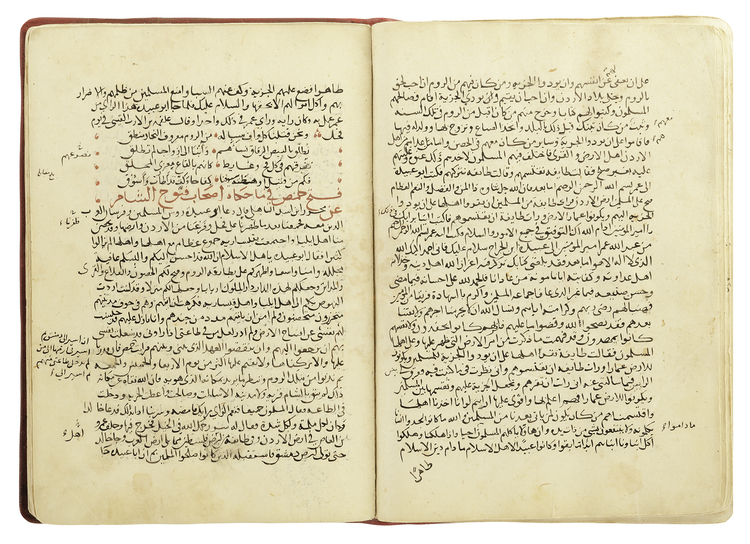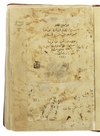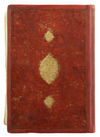IKTIFA FI MAGHAZI AL-MUSTAFA WAL KHULAFA AL-THALATHA, LATE 14TH-EARLY 15TH CENTURY, BY ABU RABI SULAIMAN IBN MUSA AL-KALA'I, BALANSIYAH/ANDALUSIA
Arabic manuscript on paper, 25 lines to each page, written in black Hijazi script, titles and catchwords written in red ink, with Arabic poems throughout. With different seal impressions and ownership statements. The 3rd volume of Kitab Fi Maghazi, About Abu Bakr's succession of the prophet 'khilafat Abu Bakr' and the main events during it. It is a very important part of the 4 volumes as it covers a very critical period of the history of the Islam, dangers and the challenges facing the new caliphate. -After the death of the prophet, a gathering of the Ansar took place in the Saqifa resulting, after some turbulences, in choosing Abu bakr. -Ridda Wars': just after the death of the Prophet, troubles emerged soon after Abu Bakr's succession, with several Arab tribes launching revolts, threatening the unity and stability of the new community and state. These insurgencies and the caliphate's responses to them are collectively referred to as the Ridda wars. The caliph distributed the available manpower among 11 main corps. 26.5 by 18 cm.
- Khalid Ibn Walid moved against Tulaiha bin Khuwailad Al-Asdee at Buzakha. Khalid had 6000 men under his disposal while Tulayha had 15000 men. Khalid got a tremendous victory which was decided by individual skills rather than by brilliant maneuvers. Then against Malik bin Nuwaira, at Butawar, with his clan Butah as a large part of Bani Tamim remained moslim. *Ridda in Oman: where the dominant tribe of Azd had revolted under their chief Laqeet bin Malik, known more commonly as 'Dhu'l-Taj'. Abu bakr sent Hudaifa bin Mihsan, later Ikrimah arrived with reinforcements from the Caliph, who defeated Dhul-Taj at a battle at Dibba.
- Ridda in Yemen: was the first the province to rebel against the caliphate when the tribe of Ans rose in arms under the leadership of its chief and self-proclaimed prophet Al-Aswad Al-Ansi, the Black One. Fairoz with remaining Yemeni muslims took shelter in the mountains for 6 months until he felt strong and marched to San'a and defeated Qias, who later surrendered with his men and were pardoned by the caliph. *Ridda in Hadhrameut: the last of the great revolts was that of the powerful tribe of Kindah, which inhabited the region of Najran, Hadhramaut, and eastern Yemen. Ziyad bin Lubaid with the forces of Muhajir and the forces of Ikrimah defeated Ash'ath and laid siege to Nujair. *Ridda in Al-Yamama: was the biggest and most threatening revolt under Musaylimah, a self-proclaimed prophet, Abu Bakr sent Ikrimah to make contact with Musaylima but not to engage until Khalid joined him. However Ikrimah, before the reinforcements arrived, attacked Musaylima and was defeated. Another commander, Shurahbil stationed with his forces at Yamamah, engaged with Musaylima's forces and was defeated too. Khalid joined the remnants of Shurahbil's corps early in December 632. The combined forces of Muslims, 13000 strong, finally defeated Musaylima's army in the battle of Yamama.
-The conquest of the Levant: Abu Bakr, reasoning that it was inevitable that one of these powers (Byzantine and Persian empire) would launch a preemptive strike against the youthful caliphate, decided that it was better to deliver the first blow himself. *Battle of Ajnadayn: it was the first major pitched battle between the Byzantine (Roman) Empire and the army of the Arab Rashidun Caliphate, with a decisive Muslim victory. Battle of Fahl with a great victory for Khalid Ibn Al-Walid. *Battle of Yarmouk: consisted of a series of engagements that lasted for six days in August 636, near the Yarmouk River, with a complete Muslim victory that ended Byzantine rule in Syria, is regarded as one of the most decisive battles in military history. After Ajnadayn the Muslim army conquered Damascus after a long siege, the army continued their march northward and in late 635 AD, Abu Ubaidah ibn al-Jarrah sent Khalid ibn Walid with his mobile guard to begin the siege of Emesa/Hums. After Yarmouk victory, Umar, the new Caliph, visited Jerusalem and gave its people "al-ʿUhda al-ʿUmariyya, after receiving the keys of the city from the Patriarch Sophronius.
In Kitab Fi Maghazi the author reviews in his four volumes the date of the beginning of Islam and parts of the life of the Messenger of God, and the invasions that took place in his days and the days of his first three successors. In all of this, he sought assistance from the works of his predecessors from among the imams of the Prophet’s biography, such as Ibn Ishaq, al-Madani, Musa ibn Uqba and al-Waqdi, but he omitted from these sources the lengthy genealogies, conflicting news and narrations. he kept only what was confirmed by the authentic hadiths narrated from the trusted companions and their relatives.
Author: Abu Rabi Sulaiman ibn Musa Al-Kala'i (555/1160-634/1237) Andalusian historian, writer, poet, Hadith scholar and Friday liturgical preacher, and ceremonial court orator in the service of the Almohads in Valencia. He was born in 565 AH/1160 AD, Murcia, and soon his family moved with him to Valencia and settled there. Then he traveled in 587 AH to seek knowledge from scholars in Andalusia, and visited Seville, Granada, Shattah and Malaga, and received Ijazeh from many scholars and sheikhs. When he returned to Valencia, the scholars flock to him from everywhere to learn from him and get an Ijazah in different sciences. He was famed for his eloquence as an orator and belletrist as He was an advanced imam in the science of recitation, He was skilled in the sciences of the Quran and intonation. He wrote several books on the Hadith, fully aware of its methods, controlling the rulings of Al-Isnad. wrote more than 25 works but he was best known for this book. Al-Kala'i was seventy years old when he participated in military campaign against t the huge Spanish army, at Anticha, seven miles from the city of Valencia, he carried the flag until he was killed, on Thursday - 20 Dhu al-Hijjah 634 AH/1237 AD.
PROVENANCE Private collection, Germany An authentication certificate from a recognized international organization is available on request.










